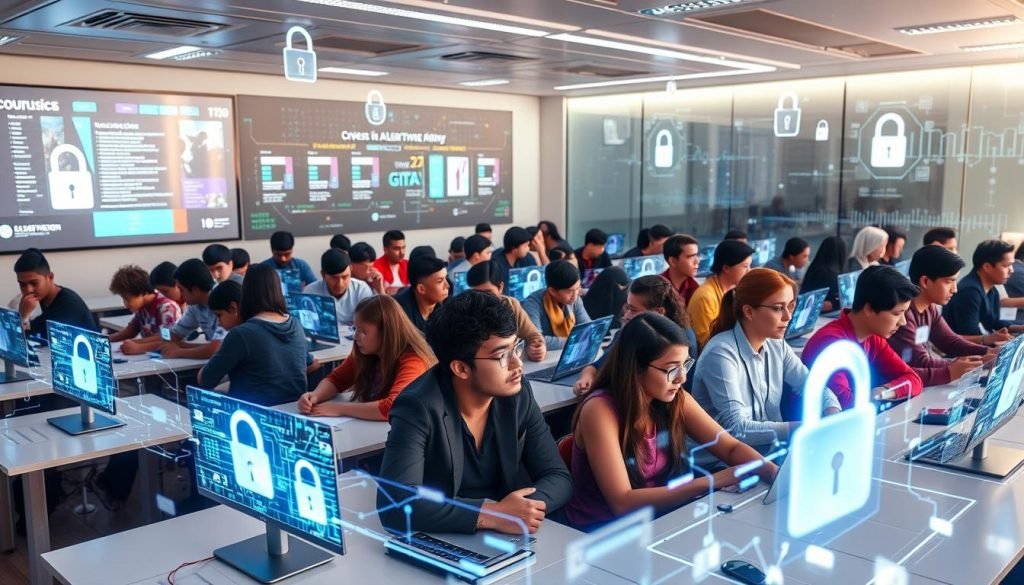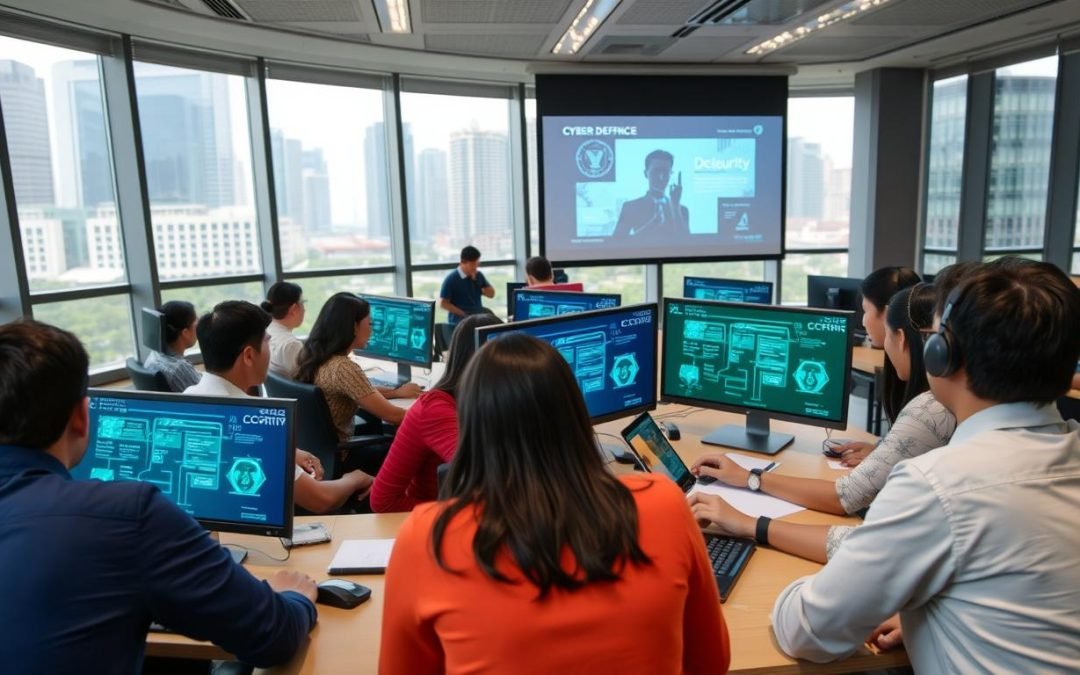Digital threats are growing fast, making cybersecurity education in Singapore more important than ever. With more cyberattacks, people and companies need skilled workers. That’s why it’s key to pick the right cyber security course in Singapore for your studies.
The cybersecurity market in Singapore is expected to grow by 13.3% from 2022 to 2027. This growth means more job opportunities for certified experts. By choosing a good cybersecurity training program, you can boost your skills. You’ll be ready for jobs like Cyber Security Engineer, Incident Response Analyst, and IT Support.
Introduction to Cybersecurity in Singapore
Cybersecurity in Singapore is now a top priority for everyone, thanks to more cyber threats. The Cyber Security Agency saw a big jump in the need for skilled workers, from 4,000 to 12,000 from 2016 to 2022. This shows Singapore’s effort to make its digital world safer for everyone.
Phishing attacks jumped by 175% in 2022, with 8,500 incidents reported. This highlights the need for better cybersecurity. Companies now look for trained people to keep data and important systems safe. This has made careers in cybersecurity some of the fastest-growing jobs, showing how crucial good training is.
Places like Vertical Institute are helping to train the next cybersecurity experts. They offer detailed courses that include real-world tools and cover important topics like how to handle cyber attacks and manage risks. The program is designed to help students deal with real challenges they might face.

With programs like SkillsFuture Credits, people over 25 can pay for courses with government help. NTUC members can also get extra help through UTAP. These programs not only train a skilled workforce but also make Singapore’s digital world safer for everyone.
The Importance of Cybersecurity Education
In today’s world, teaching people about cybersecurity is more important than ever. Cyber threats have grown from 21,518 in 2021 to 23,964 in 2022. This shows how threats are always changing. Most companies, 80%, plan to spend more on cybersecurity by 2024.

Keeping up with skills development is key in our digital world. The number of cybersecurity jobs is expected to jump by 18% in the next five years. This means more people are needed who can handle complex security issues. Those with the right education and certifications have a good chance of moving up in their careers and keeping companies safe.
Not having enough cybersecurity knowledge can lead to big problems. Companies could lose money and their reputation could suffer. They need to invest in teaching their staff to stay ahead. With the cyber security market in Singapore set to hit 363 million dollars by 2025, training in this area is crucial. Learning about cybersecurity not only builds a strong team but also keeps the internet safer for everyone.
Top Careers in Cybersecurity in Singapore
The field of cybersecurity offers many promising career paths. With the Singapore government aiming to create 30,000 new cybersecurity jobs by 2025, now is a great time to look into these career opportunities. Here are some key roles in the industry:
- Security Analyst: They keep an eye on and protect an organization’s IT systems. Security analysts make about SGD 5,367 a month. They play a key role in spotting security issues and making system upgrades.
- Penetration Tester: Also known as ethical hackers, these testers pretend to attack systems to find weak spots before bad guys can. They can earn around SGD 114,762 a year, showing the high demand for their skills.
- Cybersecurity Engineer: These engineers create and set up secure networks. Their pay varies from SGD 4,000 to SGD 6,000 a month, based on their experience and skills.
- Cybersecurity Consultant: They help organizations get better at security. Consultants can make between SGD 7,000 to SGD 9,500 a month, offering good earning potential.
- Security Architect: These experts design strong security systems to fight cyber threats. They earn about SGD 135,102 a year on average.
The cybersecurity market in Singapore is booming, reaching S$2 billion in 2022, up from S$570 million in 2015. The rise in job postings shows the urgent need for skilled people. Programs funded by the government and industry certifications are helping aspiring cybersecurity pros, promising a bright future in cybersecurity jobs.

| Job Title | Average Monthly Salary (SGD) | Average Annual Salary (SGD) |
|---|---|---|
| Security Analyst | 5,367 | 64,404 |
| Penetration Tester | N/A | 114,762 |
| Cybersecurity Engineer | 4,000 – 6,000 | 48,000 – 72,000 |
| Cybersecurity Consultant | 7,000 – 9,500 | 84,000 – 114,000 |
| Security Architect | N/A | 135,102 |
As the need for cybersecurity experts grows, those interested can look into training and certification programs. These can help unlock these rewarding career opportunities.
Choosing the Right Cyber Security Course Singapore
Choosing the right cybersecurity course is important, especially when thinking about your career goals. In Singapore, the number of cybersecurity professionals has jumped from 4,000 in 2016 to 12,000 in 2022. This jump is due to businesses going digital and the rise in cyber threats. So, picking the right course is key for those wanting to enter this field.
When looking at courses, consider your current skills and what you’re interested in. Courses range from short ones to diplomas and degrees. For example, the “Fundamentals of Cybersecurity and Applications” at Temasek Polytechnic is a self-paced online course for S$272.50. Or, the “Certified Information Security Manager (CISM)” course by NTUC LearningHub is for those with over five years of IT experience and takes 40 hours to complete through e-learning.
How much time you can dedicate to a course is also important. You can choose between full-time and part-time courses, fitting them into your life. Courses should match up with the latest industry standards, like CISSP, CEH, and GIAC. These certifications are valued in Singapore and can boost your salary, with entry-level jobs starting at SGD 4,000 and experienced roles around SGD 12,000 a month.

Choosing the right cybersecurity course can help move your career forward. Here’s a table with some top courses in Singapore:
| Course Name | Provider | Format | Cost (SGD) | Prerequisites |
|---|---|---|---|---|
| Fundamentals of Cybersecurity and Applications | Temasek Polytechnic | Online | 272.50 | None |
| Certified Information Security Manager (CISM) | NTUC LearningHub | E-Learning | Varies | 5+ years IT experience |
| SANS SEC401 | SANS Institute | In-person/Online | Varies by location | None |
| Certified Ethical Hacker (CEH) | EC-Council | In-person/Online | Varies | None |
In summary, think about how different courses match your career goals for success in cybersecurity. Picking the right course lays a strong foundation for a fulfilling career in this fast-changing field.
Overview of Cybersecurity Training Programs
Cybersecurity training is key for those wanting to enter the field in Singapore. There are many options for different skills and career goals. You can pick from basic courses to advanced diplomas, based on what you want to achieve and your job needs. Knowing the course types can help shape your career in cybersecurity.
Types of Courses Available
There are many courses to fit the needs of learners. Some top choices include:
- CompTIA Security+
- Certified Ethical Hacker (CEH)
- Certified Information Systems Security Professional (CISSP)
Some programs give certificates for single courses, while diplomas can offer several certifications. For example, you might get Security+, Certified Ethical Hacker, and Cisco Certified Network Associate. Some courses also include internships, giving you real-world experience.
Course Formats: Online vs In-Person
Choosing a cybersecurity training program means deciding on the course format. You can pick from online or in-person classes, each with its own perks.
| Course Format | Advantages | Disadvantages |
|---|---|---|
| Online Security Courses |
|
|
| In-Person Courses |
|
|
Choosing the right course format depends on what you prefer and your schedule. No matter what, it’s important to learn the basics of cybersecurity. Courses like SEO courses can also boost your digital marketing skills alongside cybersecurity.

5 Best Cyber Security Course Providers in Singapore
Finding the right course is key for those wanting to enter the cybersecurity world. Singapore has many top cybersecurity schools with various programs for new professionals. Here, we look at five well-known cybersecurity course providers. They are known for their unique programs and top training.
OOm Institute: An Overview
OOm Institute is known for its focus on practical skills. It teaches about common scams and frauds online. This approach gives students real-world skills, ready for the job challenges ahead.
NUS Cybersecurity Fundamentals Course
The NUS Cybersecurity Fundamentals Course gives a deep look into cybersecurity basics. It’s great for both newbies and pros wanting to learn more. It offers a solid base for understanding the subject.
SMU’s Cyber Risk Management Training
SMU’s Cyber Risk Management Training is for professionals. It teaches how to handle cyber risks in companies. Students learn to spot risks and come up with plans to fix them, making them more valuable at work.
SIT Cybersecurity Management Course
The SIT Cybersecurity Management Course helps students build a strong cybersecurity base. It gives them the key knowledge and skills for a good career in cybersecurity.
SUSS Introduction to Cybersecurity
SUSS’s Introduction to Cybersecurity course is great for beginners. It covers the basics of cybersecurity threats and defenses. It’s perfect for those new to the field who want to learn more.
These cybersecurity course providers offer a range of programs to match different career goals. Getting certified from these respected schools can boost job credibility and career chances. For those thinking about more education, looking into digital marketing courses could also be a good move. It can add to their cybersecurity skills.
Certification and Recognition in Cybersecurity
In today’s digital world, getting a cybersecurity certification is key for professionals wanting to boost their skills and move up in their careers. Many certifications are recognized across the industry. They prove a person’s skills and hard work, making them stand out in a crowded job market. These certifications are vital for growing professionally and show a person’s commitment to learning more.
Common Cybersecurity Certifications
There are many certifications worldwide, covering different cybersecurity areas. Some top ones include:
- Certified Information Systems Security Professional (CISSP) – A top choice for those with lots of cybersecurity experience.
- Certified Ethical Hacker (CEH) – Focuses on testing systems for security, needs at least two years of IT work.
- Offensive Security Certified Professional (OSCP) – This one tests real-world skills and assumes you know about networks and coding.
- (ISC)² Systems Security Certified Practitioner (SSCP) – Great for newcomers to cybersecurity, needing at least a year of paid work in certain areas.
Benefits of Accreditation
Getting accredited certifications brings more than just job benefits. Employers really value these credentials, making a candidate more believable. These certifications can lead to:
- Better job security as the need for certified pros grows with cyber threats.
- More career chances, since many companies want to hire those with certifications.
- Possible higher pay, as certified pros usually earn more.
The cybersecurity market is expected to hit 345.4 billion U.S. dollars by 2026. So, investing in certifications is a smart move. Those serious about their careers will see these certifications boost their resumes. They prove a person’s skills and give them a solid spot in a fast-changing field.
| Certification | Prerequisites | Focus Area |
|---|---|---|
| CISSP | 5 years of experience | Information Security Management |
| CEH | 2 years IT experience | Ethical Hacking |
| OSCP | Networking & Scripting knowledge | Penetration Testing |
| SSCP | 1 year relevant experience | Systems Security |
SkillsFuture and Funding for Cybersecurity Courses
The SkillsFuture initiative is key in Singapore, boosting lifelong learning and skills. It gives course funding to those 25 and older. This lets them take cybersecurity courses without big costs.
Cybersecurity training gets subsidized training rates based on age. Those 40 and up get a 70% subsidy, and those under 40 get 50%. Permanent Residents get 50% off too, making it easy for many to join.
Courses cover important topics like online security and managing risks. They use online lessons to mix theory with hands-on skills. After finishing, graduates connect with over 100 employers, helping them find jobs in the growing field.
Getting SkillsFuture funding is easy. People wanting to learn more about cybersecurity should check if they qualify and look for courses. This helps many start their journey in a fast-changing field.
Future Trends in Cybersecurity Education
The world of cybersecurity education is changing fast, thanks to new trends and tech advances. Schools and tech leaders are working together to shape the next generation of cybersecurity experts. A deal between Trend Micro and Singapore’s Institute of Technical Education (ITE) aims to train 3,000 students in three years. They’re focusing on IT and OT skills to meet the cybersecurity needs of Singapore’s digital economy.
Businesses want specialized skills, so education is innovating. Trend Micro will give special certifications to teachers and students. This will boost their skills in the field. The training includes hands-on activities that mimic real cyber threats. This way, students learn how to tackle cyber challenges in real life.
Cost is a big issue in cybersecurity education. Online courses are becoming popular because they’re cheaper than traditional ones. In the future, we might see more free basic courses and paid advanced ones.
The Cyber Security Agency of Singapore (CSA) was set up in 2015 to improve cybersecurity. It’s working on a plan to boost OT cybersecurity skills by adding cybersecurity courses to degree programs. This fits with the government’s push for industry partnerships, helping Singapore become a Smart Nation.
The cybersecurity training market is expected to grow a lot, reaching US$ 13,698.1 million by 2030. It will grow by 17.1% each year from 2024 to 2030. This shows how important it is for schools to prepare students for the cybersecurity challenges ahead.
| Trend | Description |
|---|---|
| Industry Partnerships | Collaboration between educational institutions and cybersecurity firms to develop relevant curricula. |
| Hands-On Training | Implementation of practical training through real-world scenario prototypes. |
| Online Education Access | Growth of online courses providing financial accessibility to a wider audience. |
| Specialized Certifications | Introduction of industry-specific certifications to enhance proficiency among students and staff. |
| Freemium Learning Models | Adoption of freemium models for course offerings, allowing free basic courses with paid advanced content. |
Conclusion
The need for strong cybersecurity training has grown due to more cyberattacks. Singapore offers a strong cybersecurity scene. Those who choose a career in this field will find many job opportunities.
There’s a big demand for cybersecurity experts. This makes it a great career choice for those with the right skills. Completing a cybersecurity course can lead to jobs like penetration testers and security analysts.
Certifications like CISSP, CISM, and CEH can boost your career. They prove your skills in a changing digital world. Getting practical experience through projects is key to being ready for the job.
As technology gets more complex, so does the need for ongoing learning. Staying updated with new skills is crucial. Choosing the right training is key to growing in this field.
FAQ
What is the best way to choose a cyber security course in Singapore?
Are there any government initiatives to support cybersecurity education?
What types of cybersecurity careers are available in Singapore?
How valuable are cybersecurity certifications like CISSP or CEH?
What should I expect in terms of course formats for cybersecurity training?
Can I find cybersecurity training programs online?
How does cyber risk management training fit into cybersecurity education?
What are some current trends in cybersecurity education?
Source Links
- https://www.oom.com.sg/institute/5-cybersecurity-courses-in-singapore-for-a-secure-future/
- https://www.comat.com.sg/classroom-learning/training/cyber-security/
- https://www.fca.edu.sg/blog/best-cybersecurity-courses-and-certifications/
- https://verticalinstitute.com/introduction-to-cybersecurity-course/
- https://www.suss.edu.sg/courses/short-course/detail/cet102
- https://inetapps.nus.edu.sg/sacs/LifeLongLearning/CourseDetails/COM-ITCP_TGS-2022012735/
- https://www.lsbf.edu.sg/blog/innovation-and-technology/10-compelling-reasons-to-study-a-cyber-security-course
- https://www.psb-academy.edu.sg/disciplines/cyber-security-courses
- https://asktraining.com.sg/blog/cybersecurity-careers-in-singapore/
- https://www.myskillsfuture.gov.sg/content/portal/en/career-resources/career-resources/job-skills-insights/Cybersecurity_JobSkills_Insights_into_the_Singapore_Landscape.html
- https://levelup.sg/?p=4151
- https://www.eccouncil.org/cybersecurity-courses-and-training-in-singapore/
- https://www.theknowledgeacademy.com/sg/courses/cyber-security-training/
- https://www.np.edu.sg/schools-courses/academic-schools/school-of-infocomm-technology/diploma-in-cybersecurity-digital-forensic
- https://www.tertiarycourses.com.sg/basic-cyber-security-course.html
- https://www.craw.sg/
- https://nus.comp.emeritus.org/cybersecurity
- https://www.csa.gov.sg/docs/default-source/our-programmes/certification-and-labelling-scheme/cls/publications/csa-cybersecurity-certification-guide.pdf?sfvrsn=a486afd5_0
- https://content.mycareersfuture.gov.sg/cyber-security-certifications-guide/
- https://verticalinstitute.com/cybersecurity/
- https://www.ntuclearninghub.com/cyber-security
- https://www.ntuclearninghub.com/it-academy/cybersecurity
- https://cioworldasia.com/2023/10/18/revolutionizing-cybersecurity-education-in-singapore/
- https://www.eccu.edu/blog/the-future-of-cybersecurity-education-online-trends-and-predictions/
- https://www.csa.gov.sg/News-Events/Press-Releases/2024/singapore-updates-operational-technology-cybersecurity-masterplan
- http://www.itsupportsingapore.sg/beginners-guide-to-cyber-security-course-singapore/
- https://aventislearning.com/cyber-security-education-is-becoming-more-important-singapore/

